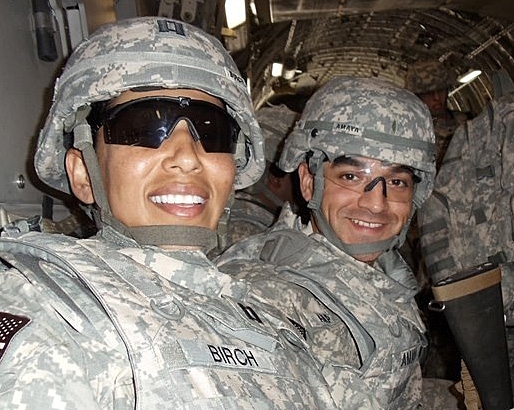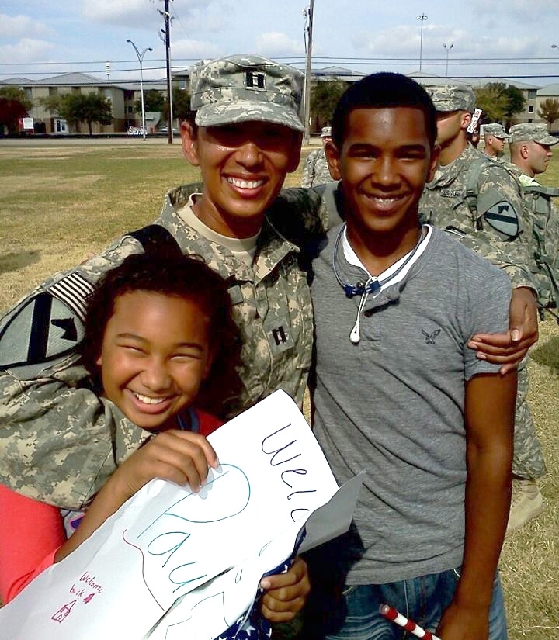Army captain fulfills her American dream
Paula Birch has a message for high school students and, particularly, young immigrants: The military has much to offer, including hope. She is living proof.
After returning from a tour in Iraq last year, Capt. Birch, 39, was named one of the lead Army recruiters in Las Vegas, which she considers an ideal place from which she can tell her story that an immigrant who is here illegally can achieve her goals and the American dream through military service.
Birch came to this country at age 7, along with her parents and six siblings. Neither she nor her brothers and sisters spoke English. Birch was born in Guadalajara, Mexico, to a Mexican mother and American father. Her parents never married, which complicated the immigration process because her father died as the family was moving to the United States. Since her parents were not married, his citizenship did not cover any family member.
Birch had to assume an adult role from a very young age .
“When my dad died, we had no way to prove that we were his children and therefore were undocumented for several years,” Birch said.
In her early years, she was enrolled in the English Language Learners program at her school in California. After graduating from high school in the late ’80s, relief came through President Ronald Reagan’s 1986 amnesty program. Birch, her siblings and mother managed to secure permanent residency. The timing was just right because Birch had earned a basketball scholarship. Things were looking up.
The family situation got worse, however, when her mother got leukemia.
“Yes, I had a scholarship, but my mom was struggling to pay the basic bills, was very sick, and I felt an obligation to help,” Birch said. “There were seven children. I was the youngest daughter but had to help her financially. Nevertheless, I was very confused, not knowing what to do.”
Turnaround in Army
It seemed to Birch that everything was falling apart. Then, one day she learned about opportunities in the military.
Birch took an interest in the Army Reserves, which allows permanent residents to serve for six years, one weekend in a month and two weeks training once a year during the summer.
Birch signed up for the reserves and continued her college education at Fayetteville State University in North Carolina, where she also played forward on the basketball team. She graduated with a degree in business administration.
After several years in the reserves, she moved to full-time status in the Army.
“The first day, I signed a contract to be a Black Hawk helicopter mechanic and crew chief. My job was to maintain the Black Hawk to perfection,” she said. Birch became the first woman helicopter crew chief, which launched a two-decade career in the Army. It has taken her to a number of states and two tours in Iraq. Along the way, she earned several promotions. Birch’s husband, Jerome, retired from the military when Paula was chosen for officer training. He now takes care of their two children, Jalen, 14, and Page, 11.
With her promotion to captain came a change in responsibilities to crew chief and to logistics.
“I provided support to the Third Brigade and was back in Iraq, but this time I was needed to support the withdrawal from the war zone, both that of equipment and of soldiers,” Birch said.
Upon her return to the United States last year, Birch jumped at the opportunity to share her story in Las Vegas with high school students, some of whom might be confused about their futures — just as she had been . Her superiors thought it would be a great opportunity to close the gap between Spanish-speaking people and the Army.
“I think she is a good asset to Las Vegas,” said her commander, Lt. Col. Bryan C. Seay, Salt Lake City Battalion commander. “She is more mature. She has spent more time in the Army, therefore, she has more experience and leadership background than the younger captains.”
And it only helps that she is a woman and is multilingual, he said. “Being a woman is an asset, especially if we are trying to recruit women, and because she speaks Spanish. There are opportunities for women in the Army, and because of her personal story and experience within the Army, she can inspire certain demographics that a male can’t. I think she has grown as a leader and she has grown within the challenges she has faced, and I am pretty sure she can surpass anything she would like to do.”
“Captain Birch is the best company commander Las Vegas has had in the recent decade,” said Sgt. Thomas Putnam, a fellow recruiter. “We’ve had some challenges here for recruiting in the past decade, and since Captain Birch’s arrival, we’ve enlisted more people to the Army Reserve than the company has enrolled in the past 10 years.”
The Army has become a huge part of her life, Birch said, and it has been a great experience. “I was the first crew chief at the time, when they did not accept women in the front lines, so I was the first woman to serve in this position.”
Birch did encounter some barriers as a woman, but she said she never had any problems with her male colleagues . On the contrary, being a woman was an asset because she learned to maintain the same physical demands as a man.
“It was a great experience, adventure, change. Every day is something different ...” Birch said.
ABILITY, NOT GENDER, MATTERS MOST
As a soldier and recruiter, Birch is in favor of former Secretary of Defense Leon Panetta’s recent decision regarding the participation of women on the battlefield. What matters most, said Birch, more than gender, is the ability to do the job.
“I do not see why (women) would not be allowed,” Birch said. “They can’t say what will happen or anticipate that they will have problems.
“There are women who are as physically capable as men,” Birch said. “If she wants to assume this role, and has the physical skills, she will achieve. It’s like the rule of ‘do not ask, do not tell.’ Their sexual orientation has nothing to do with their physical abilities to do their jobs. It is a great relief that now it can be freely discussed. That way better support can be provided. The professional aspect has nothing to do with the personal.”
Contact María Cristina Matta-Caro at
mcmatta@reviewjournal.com or 702-477-3846.





























